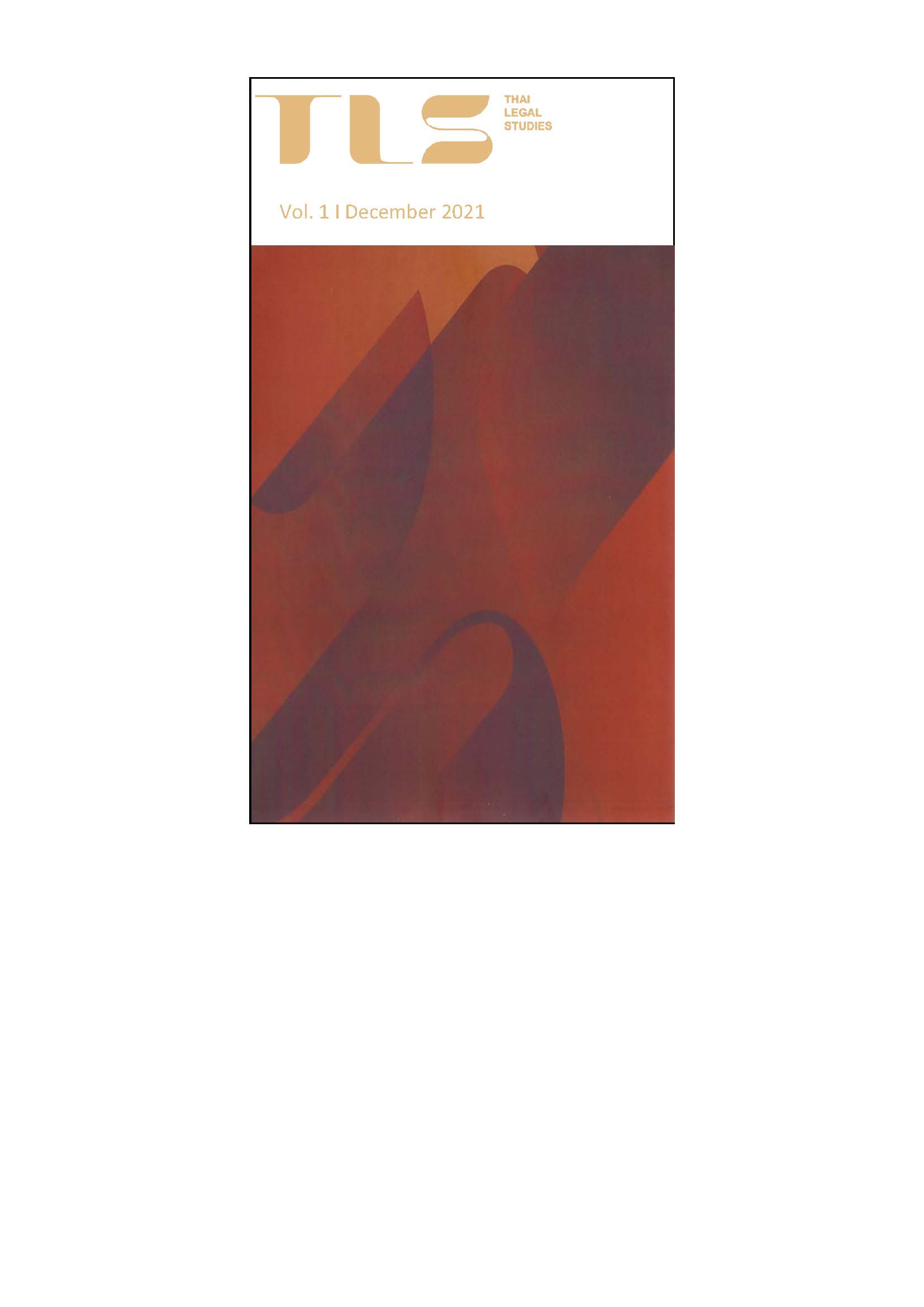Women Lawyers for Social Causes
Professional Careers and Legal Development in Thailand
DOI:
https://doi.org/10.54157/tls.246477Keywords:
Thailand women lawyers, Thailand legal profession, Thailand legal development, Rule of lawAbstract
Women lawyers are increasing seen among the leading legal defenders of human rights and social movements in Thailand. Increasing visibility is partly a result of news coverage and social media, but women lawyers activism has far older roots. In this article, we examine two related processes of change that contribute to women’s emergence as leading social cause practitioners. First, we discuss the relationship between Thailand’s legal system and its social and political development since the end of the nineteenth century. Second, we employ career narratives of three women lawyers with innovative practices for social causes as a lens through which to examine how lawyers transform available resources into an identity, law practice, and law. We discuss not only the role of prior generations of women lawyers, connections between influential elites and social cause lawyers, and the founding of a few key organizations within the NGO community, but also the role of the women as architects of their own careers. We conclude that they have become successful by aligning their practices with emerging social movements and progressive bureaucrats, unexpectedly creating professional identities with somewhat different relationships to the rule of law.
References
“Asia and the Pacific: Thailand.” UN Women. https://asiapacific.unwomen.org/en/countries/thailand
Askew, Marc. “Introduction: Contested Legitimacy in Thailand.” In Marc Askew (ed), Legitimacy Crisis in Thailand (Silkworm Books 2010).
Baker, Chris, and Pasuk Phongpaichit. A History of Thailand (2nd edn, Cambridge University Press 2005). https://doi.org/10.1017/CBO9781139194877
Bourdieu, Pierre. “The Force of Law: Towards a Sociology of the Juridical Field.” (1987) 38 Hastings Law Journal 814.
Bourdieu, Pierre, and Loïc J. D. Wacquant. An Invitation to Reflexive Sociology (Chicago University Press 1992).
Central Intellectual Property and International Trade Court Thailand. The Judicial System in Thailand: An Outlook for a New Century (Institute of Developing Economies, Japan External Trade Organization 2001).
Connors, Michael Kelley. Democracy and National Identity in Thailand (Nordic Institute of Asian Studies Press 2003). https://doi.org/10.4324/9780203361634
Dezalay, Yves, and Bryant Garth. Asian Legal Revivals (Chicago University Press 2010). https://doi.org/10.7208/chicago/9780226144665.001.0001
Dezalay, Yves, and Bryant Garth. Dealing in Virtue: International Commercial Arbitration and the Construction of a Transnational Legal Order (Chicago University Press 1996).
Doneys, Philippe. “Political Reform Through the Public Sphere: Women’s Groups and the Fabric of Governance.” In Duncan McCargo (ed), Reforming Thai Politics (Nordic Institute of Asian Studies Press 2002).
Duanghathai Buranajaroroenkij, Philippe Doneys, Kyoko Kusakabe, and Donna L. Doane. “Expansion of Women’s Political Participation through Social Movements: The Case of the Red and Yellow Shirts in Thailand.” (2018) 53 Journal of Asian and African Studies 34. https://doi.org/10.1177/0021909616654508
Engel, David M. Code and Custom in a Provincial Court (University of Arizona Press 1978).
Jackson, Peter A. “Withering Centre, Flourishing Margins: Buddhism’s Changing Political Roles.” In Kevin Hewison (ed), Political Change in Thailand: Democracy and Participation (Routledge 1997).
Juree Vichit-Vadakan. “A Glimpse of Women Leaders in Thai Local Politics.” In Kazuki Iwanaga (ed), Women and Politics in Thailand: Continuity and Change (Nordic Institute of Asian Studies Press 2008).
Kanokrat Lertchoossakul. The Rise of the Octobrists in Contemporary Thailand (Yale University Southeast Asia Studies 2016).
Kengkij Kitirianglarp, and Kevin Hewison. “Social Movements and Political Opposition in Contemporary Thailand.” (2009) 22 The Pacific Review 451–77. https://doi.org/10.1080/09512740903127978
Klein, James R. “The Battle for the Rule of Law in Thailand: The Constitutional Court of Thailand.” In Amara Raksasataya and James R. Klein (eds), The Constitutional Court of Thailand: The Provisions and Working of the Court (Constitution for the People Society 2003).
Klein, James R. The Constitution of the Kingdom of Thailand, 1997: A Blueprint for Participatory Democracy (The Asia Foundation 1998).
Le Marquer, Aaron. “Thailand Certifies First Class Action.” Tilleke & Gibbins (27 February 2018). https://www.tilleke.com/resources/thailand-certifies-first-class-action
Levin, Leslie C., and Lynn Mather. Lawyers in Practice: Ethical Decision Making in Context (Chicago University Press 2012). https://doi.org/10.7208/chicago/9780226475172.001.0001
Loos, Tamara. Subject Siam: Family, Law and Colonial Modernity in Thailand (Cornell University Press 2006). https://doi.org/10.7591/9781501728259
McCann, Michael. “Law and Social Movements.” In Austin Sarat (ed), The Blackwell Companion to Law and Society (Blackwell Publishing 2004).
McCargo, Duncan. “Competing Notions of Judicialization in Thailand.” (2014) 36 Contemporary Southeast Asia, 417–41. https://doi.org/10.1355/cs36-3d
McCargo, Duncan. Fighting for Virtue; Justice and Politics in Thailand (Cornell University Press 2019). https://doi.org/10.7591/cornell/9780801449994.001.0001
McCargo, Duncan. “Thaksin and the Resurgence of Violence in the Thai South: The Network Monarchy Strikes Back.” (2007) 38 Critical Asian Studies, 39–71. https://doi.org/10.1080/14672710600556429
Munger, Frank W. “Globalization through the Lens of Palace Wars: What Elite Lawyers’ Careers Can and Cannot Tell Us about Globalization of Law.” (2012) 37 Law & Social Inquiry 476. https://doi.org/10.1111/j.1747-4469.2012.01309.x
Munger, Frank W. “Thailand: The Evolution of Law, the Legal Profession and Political Authority.” In Richard L. Abel, Ole Hammerslev, Hilary Sommerlad, and Ulrike Schultz (eds), Lawyers in 21st-Century Societies, Vol. 1: National Reports (Hart Publishing 2020). https://doi.org/10.5040/9781509915170.ch-042
Ockey, James. Making Democracy: Leadership, Class, Gender and Political Participation in Thailand (University of Hawaii Press 2004).
Pridi Banomyong. Pridi by Pridi: Selected Writings on Life, Politics and Economy (Chris Baker and Pasuk Phongpaichit tr, Silkworm Press 2000).
Simpson, Adam. “Democracy and Environmental Governance in Thailand.” In Sacchidananda Mukherjee and Debashis Chakroborty (eds), Environmental Challenges and Governance: Diverse Perspectives from Asia (Taylor and Francis 2015). https://doi.org/10.4324/9781315717081
“Thai Districts Put Under Martial Law.” New York Times (3 November 2005). https://www.nytimes.com/2005/11/03/world/asia/thai-districts-put-under-martial-law.html
“Thai Lawyers for Human Rights.” https://www.facebook.com/tlhr2014/
“Thailand Appoints First Female Supreme Court President.” Royal Thai Embassy, Washington D.C. (2020). https://thaiembdc.org/2020/08/03/thailand-appoints-first-female-supreme-court-president/
Upham, Frank. “Mythmaking in the Rule-of-Law Orthodoxy.” In Thomas Carothers (ed), Promoting the Rule of Law Abroad: In Search of Knowledge (Carnegie Endowment 2006).
Sources in Thai
ธเนศ อาภรณ์สุวรรณ. “ขบวนการนักศึกษาไทยในช่วงแรก.” ใน วิทยากร เชียงกูล, ขบวนการนักศึกษาไทย : จาก 2475 ถึง 14 ตุลาคม 2516 (กรุงเทพฯ : สายธาร, 2546). [Thanet Arpornsuwan. “Student Movement in the First Period.” In Wittaya Chiangkul (ed), Student Movement in Thailand: From 1932 to October 14, 1973 (Bangkok-Satarn 2003).
ธีรนันท์ ธีระธนากร และ กนิษฐา ชิตช่าง. "บทบาทของสมาชิกสภาสตรีในการเคลื่อนไหวผลักดันสิทธิสตรีใน รัฐธรรมนูญ: ศึกษากรณีคุณหญิงนันทกา สุประภาตะนันทน์." (2558) 41(2) วารสารสังคมศาสตร์และมนุษยศาสตร์ มหาวิทยาลัยเกษตรศาสตร์. [Theranun Therathanakorn and Kanitha Chitchang. “The Role of Female Members of Parliament to Call for Women’s Rights in the Thai Constitution: Case Study of Khunying Nanthaka Supraphatanan.” (2015) 41(2) Journal of Social Sciences and Humanities.]
แร่ม พรหโมบล บุณยประสพ. “เสี้ยวหนึ่งแห่งความทรงจำ.” (สถาบันปรีดี พนมยงค์ 2553). [Ram Promobol. “Part of My Memory.” (Pridi Institute 2020). https://pridi.or.th/th/content/2020/05/266
วารุณี โอสถารมย์ และคณะ. ผู้ประศาสน์การและอธิการบดีมหาวิทยาลัยธรรมศาสตร์ (พ.ศ. 2477–2556): ประวัติชีวิต ความคิด และการทำงาน (มหาวิทยาลัยธรรมศาสตร์ 2556). [Warunee Osodtarom et al. (eds). Administrators and Rectors of Thammasat University: Life History, Ideology and Their Work (Thammasat University 2013).]
“ไสลเกษ’พ.อาวุโสในศาลฎีกา ‘เมทินี’ปธ.ศาลฎีกาหญิงคนแรก ‘ปิยกุล’ขึ้นปธ.ศาลอุทธรณ์.” ข่าวสด (9 สิงหาคม 2563). [“Slaikate – Senior Judge on the Supreme Court, Methinee – First Female Supreme Court President, Piyakul Appointed Appellate Court President.” Khaosod (9 August 2020).] https://www.khaosod.co.th/newspaper-column/people/news_4666205
Published
Issue
Section
License
Copyright (c) 2021 Frank W. Munger, Peerawich Thoviriyavej, Vorapitchaya Rabiablok

This work is licensed under a Creative Commons Attribution 4.0 International License.
Authors retain copyright and publishing rights without restrictions, but grant Thai Legal Studies the right of first publication in English and to distribute the work under a Creative Commons Attribution 4.0 International Public License (“CC BY 4.0”). It allows others to freely share the work, including the making of translations. There is no charge or fee for readers to immediately view published articles or content, and users are allowed to read, download, copy, distribute, print, search, link to the full texts of the articles, or use them for any other lawful purpose, without asking prior permission from Thai Legal Studies or the author(s), the only requirement being that an acknowledgement is given of the work’s authorship and its initial publication in English by Thai Legal Studies.







